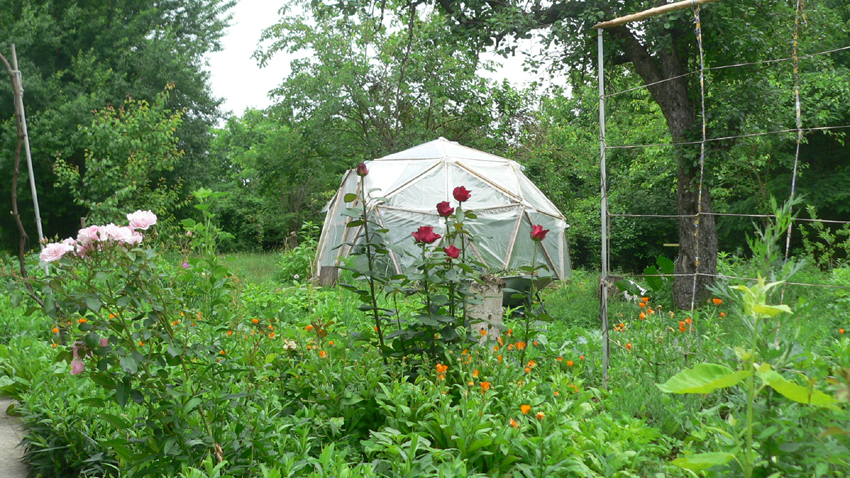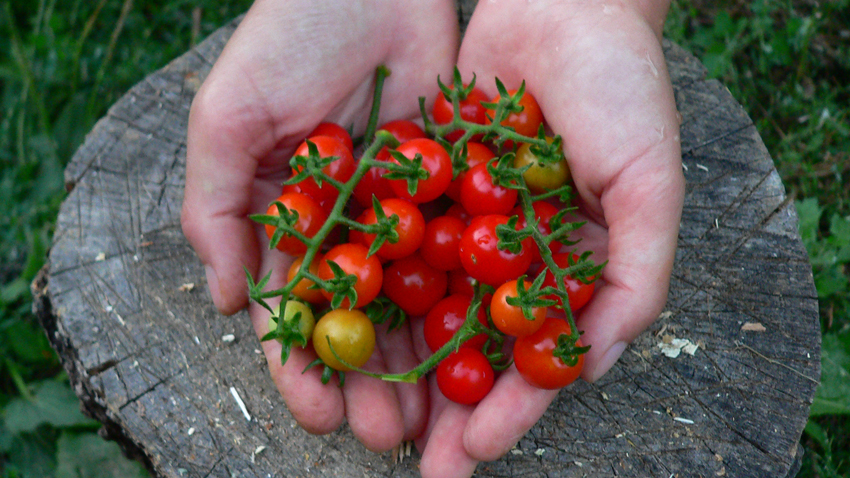Land Alive: in this way Elitsa and Krassimir call the place they chose to make into their home: an old adobe house with a small garden large enough to accommodate a dream. The young family dreams of real, intransient things - being close to nature, protect the environment, share values and engage in creativity. They believe that “big things take place via small choices”.
Four years ago they decided to abandon the big city and moved to the provinces. “We used to live in Sofia. We studied there and then worked for a while but we were not happy with the prospect of raising our children in an urban environment. So we moved to a calmer and greener place”, Elitsa says.
Recently the number of Bulgarians who choose to return to the idyll of villages has been rising steadily. Last year alone a record number of them, 33,500, decided to carry out this major change, a survey of the Association of Bulgarian Villages has found. These were mostly young and active people aged from 18 to 45. There is a rising demand for cottages with gardens in the regions of Burgas, Plovdiv and Blagoevgrad.

Elitsa and Krassimir have chosen the village of Hotnitsa not far from the central town of Veliko Tarnovo. „The village is an interesting place with its history. It was the location of Thracian settlements and one of the oldest gold treasures in Bulgaria was found here. The natural scenery is just breathtaking with a stunning waterfall”, Elitsa tells us. She and her husband supported by a few friends have fully renovated an old adobe house using natural materials: mud, clay and straw. „The feeling of inhabiting such a home is completely different from living in a prefab block of flats”, the young woman argues. One of her hobbies is to care for their small vegetable and fruit garden. “We are trying to achieve food independence, i.e. to grow our own food, to be sure what we consume exactly”, Elitsa explains and adds:
„We want to try and have the lightest possible imprint on the land and the environment. We both believe that everybody can change things as we make small everyday choices. We are tired of hearing the statement that Bulgarians will never do well. No, what we have to do is act and work. We do such small things here by collecting rainwater that we use to water the garden. We also have a compost toilet. Our priority is to use resources in a smart way. We compost organic waste and the rest we dispose of separately.”
Apart from providing for organic food to their family Elitsa and Krassimir dream of preserving some old Bulgarian seed varieties. „There are fewer and fewer people who yield their own seeds and keep them. Even the elderly in our village have the knack of buying them from a store - but these are new, selected seeds”, the young woman says with regret. So, an idea was born in the family's circle of friends to create a Seed Library for the region of Veliko Tarnovo.
„At first the idea was for a Seed Bank but it was too big as a project. So we opted for a Seed Library. The idea is to collect seeds and give them to foster families. They should knowledgeably care of the plants, collect seeds and return them to us. Every plant has its specifics and two varieties of corn cannot be raised close to one another as there is a risk or cross-pollination. This is important to us because we seek to protect seeds that we have inherited from our ancestors. They are more sustainable because they are not hybrid. Today seed varieties sold in stores are predominantly hybrid and soon they will be genetically modified.”

The Seed Library campaign is new, so the collection now has only 50 seeds. Elitsa cares for the house and the kids but creativity matters to her as well. So, she has set up a small workshop for plant-based handmade soap.
„As another way of not harming nature I decided to make my own soap. We are vegetarian and I do not like to use animal fat. I make soap using coconut and sunflower oils, as well as olive oil. I make my own herb extracts from the garden and the scent comes from essential oils. The soap is organic free of any added colorants or artificial flavors that harm human health.”
In Hotnitsa there are 600 houses but the residents are about 200, Elitsa tells us. There are a few young families who live there, plus an English community. “We have many friends among them and we have formed a mutual aid group”, she says and admits she has not for a moment missed the big city, apart from the friends. „We travel often and invite them to come over, though”, Elitsa smiles. And the worldwide web has provided a handful of communication channels. Elitsa's husband Krassimir works on various projects online and in this way supports the family budget. The young man is an ornithologist and carries out bird watching. „His work is interesting to us and the kids, and we often go with him for burd watching”, concludes Elitsa.
English Daniela Konstantinova
Timișoara, a large multicultural city in western Romania, is the center of the historical community of the Banat Bulgarians . The members of this community are descendants of settlers from the Bulgarian lands nearly three centuries ago, who have..
In Gabrovo – a city in the geographical center of Bulgaria, once described as the Bulgarian Manchester, but today facing demographic challenges – there are young people who believe that the future can be better and that this largely..
For 15 years, Stela Nedkova has been living in Brussels . After completing her education in Bulgaria, she decided to test herself in a different reality to see whether she could handle life’s challenges on her own, without her parents’ help. Stela faced..

+359 2 9336 661
